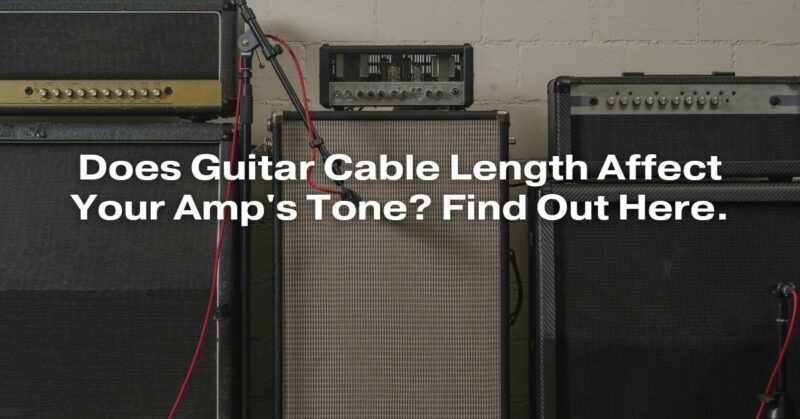When it comes to electric guitars and amplifiers, the discussion often centers around the instruments themselves, the type of amp, and the various effects pedals used to shape the tone. However, one often-overlooked factor that can significantly impact your guitar’s tone is the length of the cable connecting your guitar to the amplifier. In this article, we will delve into the fascinating world of guitar cables and explore whether their length can affect your amp’s tone.
The Basics of Guitar Cables
Before we dive into the potential impact of cable length on tone, let’s understand the basics of guitar cables. A guitar cable is essentially a conductor that carries the electrical signal from your guitar to the amplifier. These cables are typically made from copper or a combination of copper and other metals, with various shielding materials to protect against interference.
How Cable Length Might Impact Tone
- Signal Loss and Impedance: One of the primary ways in which cable length can affect your amp’s tone is through signal loss and impedance. As the electrical signal travels through the cable, it encounters resistance, capacitance, and inductance, all of which increase with longer cable lengths. This can result in a loss of high-frequency content and a reduction in overall signal clarity. However, the extent of this loss depends on the cable’s quality and construction.
- High-Frequency Roll-Off: Longer cables can lead to high-frequency roll-off, which means that the upper frequencies of your guitar signal may be attenuated. This can result in a duller or warmer tone, which might be desirable in some situations but not in others. Musicians who prefer a bright and cutting tone might find shorter cables more suitable.
- Cable Capacitance: Cable capacitance is another factor to consider. Longer cables tend to have higher capacitance, which can contribute to a slight loss of high-end frequencies. Some guitarists might actually prefer this as it can mellow out an overly bright guitar or amp combination.
- Cable Quality Matters: It’s important to note that the quality of the cable you use plays a significant role. High-quality cables are designed to minimize signal loss and maintain the integrity of your guitar’s tone over longer distances. Investing in a well-made cable can help mitigate the tone loss associated with cable length.
- Your Musical Style: Your choice of cable length should also align with your musical style and performance needs. If you’re a guitarist who moves around a lot on stage, a longer cable may be necessary for mobility, and the tonal differences might be a compromise you’re willing to make.
The Myth of the “Tone-Sucking” Cable
In guitar circles, you might hear the term “tone-sucking cable” thrown around. This term suggests that longer cables inherently degrade your guitar’s tone. While it is true that cable length can affect tone, it’s important to avoid overstating this impact. Modern cables, especially those of high quality, are designed to minimize tone loss, and the difference in tone between short and long cables is often subtle and context-dependent.
Practical Considerations
- Experimentation: The best way to determine the impact of cable length on your amp’s tone is to experiment. Try different cable lengths and pay close attention to how they affect your sound in various settings and musical contexts.
- Cable Quality: Invest in high-quality cables, regardless of length, to minimize any potential tone loss. Well-constructed cables can make a significant difference in preserving your guitar’s tone.
- Balancing Act: Finding the right balance between cable length and tone is key. If you find that a shorter cable provides the clarity and brightness you desire, consider using a wireless system or a cable extender to maintain mobility on stage.
Conclusion
While guitar cable length can have a subtle impact on your amp’s tone due to signal loss and impedance factors, the effects are often not as dramatic as some might suggest. Modern cables and high-quality construction can minimize these issues. Ultimately, your choice of cable length should be based on practicality, stage setup, and personal tonal preferences. Experimentation is key, and don’t be afraid to try different cable lengths to find the sweet spot that works for you and your music.


